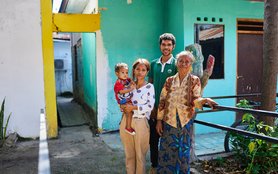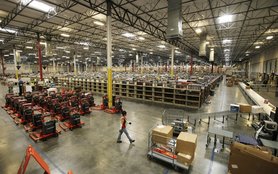The World Bank and the IMF must seize their early chance in what could be a watershed year to end extreme global poverty by putting the battle against inequality, climate change and tax dodging at the very top of its Spring Meetings’ agenda this week, urged Oxfam.
Oxfam highlighted how the World Bank and IMF could send a strong signal into the three major Summits later this year that will seek to secure ambitious new sustainable development and climate change goals, and long term financing to help a billion poor people work themselves out of poverty.
The international anti-poverty organization said that the World Bank President Jim Yong Kim’s plan announced last week, Growth, Invest and Insure is a start, but it will not succeed in ending extreme poverty within the next 15 years, unless both he and the IMF’s Managing Director Christine Lagarde show the world that fighting inequality and climate change are a vital part of this plan.
“Poverty, inequality and climate change go hand in hand,” said Nicolas Mombrial, Head of Oxfam’s Washington Office. “Only by loosening their grip will the near billion people living in extreme poverty have the chance to build brighter futures.”
“It is scandalous that we are bound by a flawed international tax system that makes poor people poorer and a small elite wealthier,” Mombrial continued. “The Ebola crisis is a stark reminder of what that means, where the amount that Sierra Leone has lost in one year to corporate tax dodgers has been more than eight times the government’s spending on health.”
Given current trends, the wealthiest one percent of the world will own more than everyone else next year, while a billion people are struggling to live on less than $1.25 a day. Meanwhile, the gathering pace of climate change threatens to put development in reverse.
The World Bank and the IMF should also influence how the sustainable development goals could be financed by unlocking the enormous potential resources from an improved international tax system that penalizes corporate tax dodgers. Developing countries lose $100 billion annually to corporate tax dodging, enough for every child in the world to go to school four times over.
Oxfam urged the Word Bank and IMF to support a clamp down on corporate tax dodging and lobby governments to support a World Tax Summit. Governments must put fixing the broken international corporate tax system at the forefront of talks at the Financing for Development Conference in Addis Ababa in July. There, Oxfam wants to see governments change rigged tax rules and act to create fair and inclusive international tax reform to finance sustainable development.
“The World Bank and the IMF have the authority and membership to ensure this is high on the agenda but the World Bank especially seems fixated on leveraging private finance to fund,” said Mombrial. “Private finance has a role to play but is no panacea.”
Oxfam wants to see the World Bank and other donors commit to more funding to help tackle the ongoing Ebola crisis and work towards a ten-year plan to rebuild free and public national health systems that serve everyone. The Bank must also do more to improve land rights for vulnerable communities. Its private sector lending arm (the IFC) currently cannot properly track its investments into third-party developers or know whether these downstream projects are helping or harming poor communities.
Oxfam is also calling for Jim Yong Kim and Christine Lagarde to pressure national governments to make sure that poor people who are most affected by climate change are central to an agreement at the UN Paris climate talks, starting in November. Rich countries must be pressed to stand by their current commitments to mobilize $100 billion per year by 2020 to help poor countries fight climate change, and to lay the ground for a new round of finance commitments to be struck in Paris for the post-2020 period. The World Bank can itself help to build momentum for success in Paris by more urgently shifting its investments away from fossil fuels and towards sustainable renewable alternatives.


